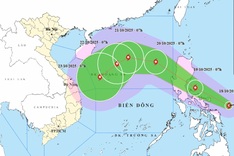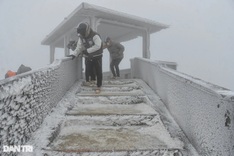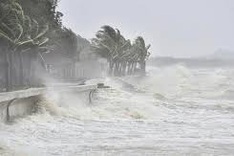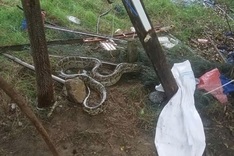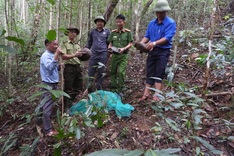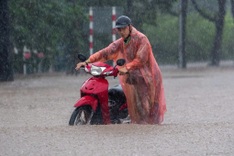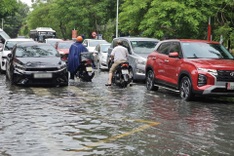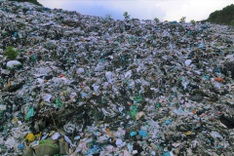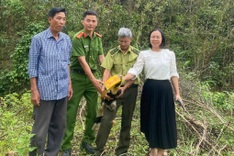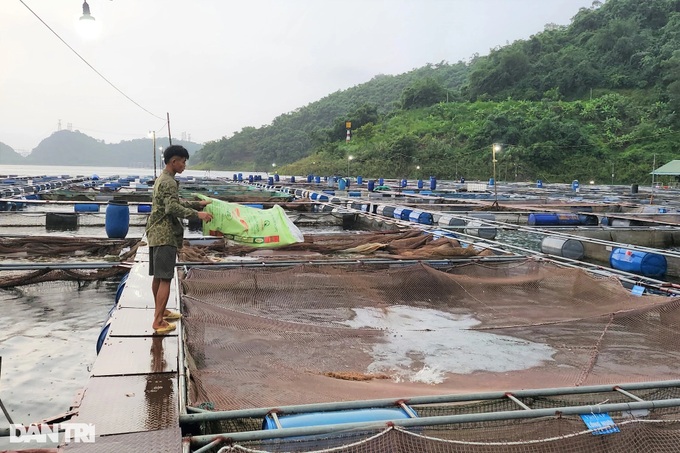
A farmer works at a fish farm in Hoa Binh Province. Photo by Dantri.
Although significant progress has been made, much remains to be done to effectively implement the 911 Project on environmental protection in the fisheries sector, two years into its rollout.
Director Trần Đình Luân of the Directorate of Fisheries under the Ministry of Agriculture and Rural Development offered that view during the 2024 Fisheries Environmental Protection Conference in Hanoi on Wednesday.
The event was part of the Mekong Delta Coastal Habitat Conservation (MDC) Project, funded by USAID through the International Union for Conservation of Nature (IUCN).
Chief of Party for the MDC project, Andrew Wyatt, said the programme which began in 2024, would assist in assessing the environmental impact of aquaculture, promoting advanced aquaculture practices, creating action plans for biodiversity conservation in the Delta and supporting marine plastic waste collection in Phu Quoc.
Luân said after more than two years of implementing the project, some positive results had been recorded.
All provinces and cities across the country issued plans and took concrete actions to implement the 911 project in line with local conditions.
International organisations worked alongside relevant authorities to develop programmes integrating environmental protection and biodiversity preservation within the fisheries sector, contributing to the sustainable development of the industry.
Head of the Science, Technology and International Cooperation Office at the Directorate of Fisheries Nguyễn Thị Phương Dung said over the past two years, the ministry had coordinated with relevant ministries, localities and agencies to implement the project.
The implementation included organising guidance, supervision, monitoring and annual reviews of the project's progress.
In 2023, the ministry carried out inspections and monitoring in Hai Phong, Quang Ninh, Quang Nam, Can Tho, and Kien Giang.
Several initiatives were launched to raise awareness about environmental protection in the fisheries sector.
Conferences, workshops and forums on managing plastic waste in the sector were held between 2022 and 2024.
The ministry also collaborated with international organisations to launch various environmental protection campaigns within the fisheries industry.
That led to increased international cooperation in the sustainable development of fisheries, such as the development of technical guidelines on climate change adaptation in aquaculture and the fisheries economy in ASEAN countries.
Additionally, the ministry shared strategic development goals for sustainable fisheries with international partners, embassies and non-governmental organisations in Vietnam.
It studied mechanisms and policies to encourage the sustainable use of aquatic resources and mobilised public and private resources for environmental protection.
It also integrated environmental protection activities into ODA-funded projects focusing on sustainable fisheries management.
Regarding local efforts, provinces and cities such as Hanoi, Quang Ninh, Danang, Bac Lieu, Quang Tri, Binh Thuan, Bac Lieu, and Kon Tum developed implementation plans for the project.
Other provinces of Hoa Binh, Binh Duong, Dong Thap, Ha Tinh and Hung Yen issued official documents to carry out the project.
Additionally, several provinces incorporated the project’s activities into their local development plans, such as Thanh Hoa, Dong Thap, An Giang, Bac Ninh, Dien Bien, Thai Nguyen, Lang Son, Gia Lai, Yen Bai, Vinh Phuc, Thua Thien-Hue and Tra Vinh.
Some provinces, like Binh Dinh, Thua Thien-Hue, Soc Trang and Kien Giang, proactively sought ODA funding for the project.
Key achievements
Deputy Head of the Kien Giang Fisheries Division Võ Văn Võ said the treatment of waste in aquaculture had seen notable improvements, with 95 per cent of shrimp farming areas now equipped with wastewater treatment systems.
All high-tech shrimp farms, covering 2,000ha, and all shrimp-rice farming areas, covering 110,038ha in the province, used probiotics throughout the farming process.
The use of sparse farming techniques had significantly reduced the potential for wastewater contamination.
The division operated an automatic water quality monitoring system, including seven stations with modern equipment placed at key water supply and aquaculture sites.
Data from the stations was updated every five minutes and made available via the ministry's website and mobile apps, allowing farmers to access real-time water quality information.
In fisheries extraction activities, there had been a halt on new fishing vessel construction and a gradual reduction in environmentally harmful fishing methods, such as trawl nets and gill nets.
The total fishery output had decreased from over 600,000 tonnes in 2021 to approximately 437,000 tonnes in 2023.
The province had promoted awareness among fishing vessel owners and fishermen to reduce the use of disposable plastic products.
The Phu Quoc Marine Conservation Area had annually developed monitoring plans and organised waste collection and sorting programes in line with regulatory requirements.
The division finished the investigation and evaluation of aquatic resources and habitats in the local sea, to serve as a scientific basis for the management, exploitation, protection and development of aquatic resources in the province.
It also coordinated with the directorate of fisheries and relevant international organisations to implement the MDC project.
The provincial Agriculture and Rural Development Department worked with World Wildlife Fund Vietnam to launch several plastic waste reduction initiatives, including pilot schemes in Rach Gia City as well as training workshops on plastic waste reduction for local teachers, youth union members and residents.
Deputy Director of the Soc Trang Province’s Department of Agriculture and Rural Development Quách Thị Thanh Bình said that in 2023, 15 training workshops were held to raise environmental awareness among 600 people involved in aquaculture.
Across 2024, 20 additional training workshops were conducted so far.
Monitoring activities were continued, including the analysis of 4,022 environmental samples for timely warnings to local farmers.
Weekly updates based on environmental data had been sent to farmers and cooperative groups via various communication channels, including local radio, email, Zalo and Facebook.
Through dissemination, local people had raised awareness of implementing solutions in aquaculture activities such as waste treatment through biogas systems, controlling circulating water sources and treating water before releasing into the natural environment.
Difficulties
Despite the progress, challenges remain.
Luân highlighted the increased difficulties of managing environmental issues in fisheries due to climate change, rising sea levels and unpredictable weather patterns, particularly in the Mekong Delta region.
Waste investigations from aquaculture activities had not yet been fully implemented to assess environmental impact, meaning that many mitigating measures were still lacking.
Waste treatment systems for small-scale fisheries remained underdeveloped, with limited investment in the required infrastructure.
The application of environmental standards and regulations in aquaculture had been inconsistent, with slow adaptation to the fast pace of production growth.
Natural resources of aquatic products had not been investigated and evaluated as a basis for planning to serve the work of management and effective use.
Circular economic models and green economy in the aquatic value chain were only in the initial development stage, not yet becoming the driving force to create sustainable development strength for the entire chain.
Financial and human resources for environmental protection in the fisheries sector remained insufficient.
In the meantime, Dung said that central Government funding for environmental projects of the ministry was limited and staffing for environmental advisory roles was inadequate.
The lengthy approval process for ODA projects further delayed the implementation, especially for technology-based projects.
At the local level, environmental protection activities were often integrated into broader development plans, leading to inconsistent results.
Local resources for environmental management were also limited, with many areas not allocating specific budgets for environmental protection.
Recommendations
Võ called for the directorate of fisheries at localities to increase training and provide further guidance to improve local environmental management capacity.
He also recommended continued international support, especially in the development of protected marine areas, environmental monitoring and sustainable fisheries management.
Bình suggested that to mitigate the environmental impact of aquaculture, the following actions should be prioritised:
- Sustainable aquaculture planning that aligned with local ecological, economic and security conditions needed to be deployed.
- Rigorous monitoring and control of water quality, feed, veterinary medicines and other chemicals used in aquaculture, alongside improved waste treatment and water reuse should be carried out.
- It was crucial to implement the conservation of native fish species and the use of climate-resilient aquaculture breeds.
-Raising awareness and accountability among aquaculture operators to comply with environmental regulations and quality standards was also urged.
The adoption of water-efficient aquaculture technologies that reduced pollution and improved feed, fertiliser and chemical use was necessary.
It was advised to enhance enforcement of environmental regulations in aquaculture, with more support for education, outreach and research into sustainable aquaculture practices.

